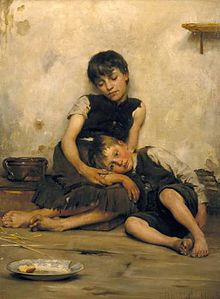Orphan

An orphan (from the Greek ὀρφανός) is a child permanently bereaved of his or her parents.[1][2] In common usage, only a child (or the young of an animal) who has lost both parents is called an orphan.
In certain animal species where the father typically abandons the mother and young at or prior to birth, the young will be called orphans when the mother dies regardless of the condition of the father.
Definitions
Various groups use different definitions to identify orphans. One legal definition used in the USA is a minor bereft through "death or disappearance of, abandonment or desertion by, or separation or loss from, both parents".[3]
In the common use, an orphan does not have any surviving parent to care for him or her. However, the United Nations Children's Fund (UNICEF), Joint United Nations Programme on HIV and AIDS (UNAIDS), and other groups label any child that has lost one parent as an orphan. In this approach, a maternal orphan is a child whose mother has died, a paternal orphan is a child whose father has died, and a double orphan has lost both parents.[4] This contrasts with the older use of half-orphan to describe children that had lost only one parent.[5]
Populations
Orphans are relatively rare in developed countries, as most children can expect both of their parents to survive their childhood. Much higher numbers of orphans exist in war-torn nations such as Afghanistan.[6]
| Continent | Number of orphans (1000's) |
Orphans as percentage of all children |
|---|---|---|
| Africa | 34,294 | 11.9% |
| Asia | 65,504 | 6.5% |
| Latin America & Caribbean | 8,166 | 7.4% |
| Total | 107,964 | 7.6% |
- 2001 figures from 2002 UNICEF/UNAIDS report[7]
- China: A survey conducted by the Ministry of Civil Affairs in 2005 showed that China has about 573,000 orphans below 18 years old.[8]
Notable orphans
Notable orphans include world leaders such as Nelson Mandela and Andrew Jackson; the Muslim prophet Muhammed; writers such as The Brontë sisters, Edgar Allan Poe, and Leo Tolstoy. The American orphan Henry Darger portrayed the horrible conditions of his ophanage in his art work. Entertainment greats such as Louis Armstrong, Johann Sebastian Bach, Marilyn Monroe, and Babe Ruth; and innumerable fictional characters in literature and comics.
Orphans in literature

Orphaned characters are extremely common as literary protagonists, especially in children's and fantasy literature.[9] The lack of parents leaves the characters to pursue more interesting and adventurous lives, by freeing them from familial obligations and controls, and depriving them of more prosaic lives. It creates characters that are self-contained and introspective and who strive for affection. Orphans can metaphorically search for self-understanding through attempting to know their roots. Parents can also be allies and sources of aid for children, and removing the parents makes the character's difficulties more severe. Parents, furthermore, can be irrelevant to the theme a writer is trying to develop, and orphaning the character frees the writer from the necessity to depict such an irrelevant relationship; if one parent-child relationship is important, removing the other parent prevents complicating the necessary relationship. All these characteristics make orphans attractive characters for authors.
Orphans are common in fairy tales, such as most variants of Cinderella.
A number of well-known authors have written books featuring orphans. Examples from classic literature include Charlotte Brontë, Charles Dickens, Mark Twain's Tom Sawyer, and L.M. Montgomery's Anne of Green Gables books. Among more recent authors, A.J. Cronin, Lemony Snicket, Roald Dahl, J.K. Rowling's Harry Potter series, as well as some less well-known authors of famous orphans like Little Orphan Annie and the Baudelaire siblings of A Series of Unfortunate Events, have used orphans as major characters. One recurring storyline has been the relationship that the orphan can have with an adult from outside his or her immediate family.
Orphans in Holy Scriptures
Many books of the Bible as well as the Quran contain the idea that helping and defending orphans is a very important and God-pleasing matter.[10] Several citations:
- And they feed, for the love of Allah, the indigent, the orphan, and the captive, - (The Quran, The Human: 8)
- Therefore, treat not the orphan with harshness, (The Quran, The Morning Hours: 9)
- "Do not take advantage of a widow or an orphan." (Hebrew Bible, Exodus 22:22)
- "Religion that God our Father accepts as pure and faultless is this: to look after orphans and widows in their distress and to keep oneself from being polluted by the world." (The New Testament, James 1:27)
- "Leave your orphans; I will protect their lives. Your widows too can trust in me." (Hebrew Bible, Jeremiah 49:11)
See also
References
- ^ Merriam-Webster online dictionary
- ^ Concise Oxford Dictionary, 6th edition "a child bereaved of parents" with bereaved meaning (of death etc) deprived of a relation
- ^ Iii. Eligibility For Immigration Benefits As An Orphan
- ^ UNAIDS Global Report 2008
- ^ See, for example, this 19th century news story about The Society for the Relief of Half-Orphan and Destitute Children, or this one about the Protestant Half-Orphan Asylum.
- ^ Virginia Haussegger Mahboba's promise ABC TV 7.30 Report. 2009. http://www.abc.net.au/7.30/content/2009/s2615472.htm (last accessed 15 July 2009)
- ^ TvT Associates/The Synergy Project (2002). "Children on the Brink 2002: A Joint Report on Orphan Estimates and Program Strategies" (PDF). UNAIDS and UNICEF.
{{cite web}}: Unknown parameter|month=ignored (help) - ^ [1] China to insure orphans as preventitive health measure]
- ^ Philip Martin, The Writer's Guide to Fantasy Literature: From Dragon's Lair to Hero's Quest, p 16, ISBN 0-87116-195-8
- ^ Bible Resources
